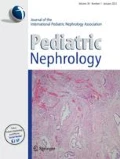Case summary
An 11-year-old African American boy with sickle cell trait (hemoglobin AS) was admitted for evaluation of intermittent painless gross hematuria for 3 months. Initially, the hematuria occurred once every 2 weeks, but it had increased in frequency to two to three times per week. He denied colicky abdominal pain, urinary frequency, or urgency. There was no history of recent trauma. He had never had a urinary tract infection. He was taking no medications and had no recent history of exposure to high altitude. The family history and his review of systems were otherwise unremarkable.
Physical examination revealed: weight, 60 kg (>97%); height, 155 cm (95%); temperature, 98°F; heart rate, 87/min; respirations, 18/min; blood pressure, 116/68 mmHg.
In general, the patient appeared healthy and not in acute distress. He had no pallor. The abdomen was soft, with mild tenderness in the right upper quadrant. The remainder of the examination was normal.
Admission laboratory testing revealed: white blood cell count, 6760/mm3; hemoglobin, 12.3 g/dL; hematocrit, 37.7%; mean corpuscular volume, 73.9 fL; platelet count, 390,000/mm3; sodium, 135 mmol/L; potassium, 4.2 mmol/L; chloride, 105 mmol/L; bicarbonate, 21 mmol/L; blood urinary nitrogen, 10 mg/dL; creatinine, 0.54 mg/dL; glucose 107 mg/dL; calcium, 9.5 mg/dL; total protein, 7.1 g/dL; albumin, 4.4 g/dL; uric acid, 4 mg/dL; C- reactive protein, 1.4 mg/dL (normal); C3 complement, 78 mg/dL (normal); ratio of urinary calcium to creatinine, 0.05 (normal <0.2). The results from the urine analysis were: yellow, clear, pH 6.5; specific gravity, 1.030; protein, 30 mg/dL; red blood cells (RBC), 20–30 RBC per high power field; nitrites, negative; leukocyte esterase, negative; no casts. Urine culture showed no growth.
Questions
What is your differential diagnosis in this patient with sickle cell trait and recurrent macroscopic hematuria?
What is the most likely diagnosis in this patient?
What test(s) would you order to confirm the diagnosis?
Author information
Authors and Affiliations
Corresponding author
Additional information
The answer to this question can be found at https://doi.org/10.1007/s00467-008-0984-x.
Rights and permissions
About this article
Cite this article
Tawadrous, H.K., Liu, W., Amodio, J. et al. A child with sickle cell trait and macroscopic hematuria: question. Pediatr Nephrol 24, 1307 (2009). https://doi.org/10.1007/s00467-008-0983-y
Received:
Revised:
Accepted:
Published:
Issue Date:
DOI: https://doi.org/10.1007/s00467-008-0983-y

